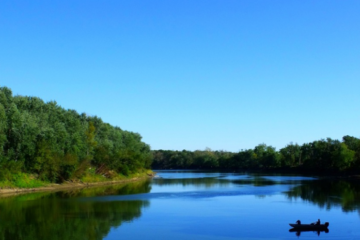In this article, First Church member Diana Hoke recounts a poignant moment from our congregation’s recent past, where the symbolism of baptism merged with a powerful call to action. Inspired by the ceremony’s vows, Diana’s narrative illuminates the strength of collective action driven by love and compassion.

You might recall this past winter when our congregation participated in a “Remembrance of Baptism” recitation on a gray and chilly Sunday morning. It was a lovely part of the worship service in which our pastor reminded us that “The Water’s Fine.” At the front of the sanctuary, the white satin-draped stands holding clear vessels of blessed baptismal water shimmered with polished rocks in the bottom of each. Together we recited our “Remembrance” lines in unison, reminding me of a hive of bees, humming our promise to God through our bond with one another.
As sometimes happens to most of us, I confess I had other thoughts buzzing in my head even as I hummed along with the lines. My mind was on a speech I was planning to deliver the very next evening. It was important, and it had to be powerful. But it wasn’t quite there—yet. Great caution was needed in how this speech was framed and how it was worded. I was restless, unsettled that the deadline was approaching quickly.
The congregational humming continued. Suddenly my meandering oratorical thoughts abruptly stopped as we recited this line: “We accept the freedom and power God gives us to resist evil, injustice, and oppression in whatever forms they present themselves!”
Amazing Grace, how sweet the sound! There it was! God had given us “freedom and power” to do extraordinary work. The next day I would be standing in front of a school board, in a packed room of community members, defending the educational rights of students who are members of minority populations based on gender identity, sexual orientation, and race. Schools are under an unjust threat from a national movement to remove anything in a school, including books, that not only offers support specifically for these students but also demonstrates to others how to be accepting of them. The board, its teachers, and its students had to be shown that there are united adults in their community who will stand up to prevent this insidious form of oppression from creeping into their schools.
By Sunday afternoon the words fell into place, and I knew how I needed to say them. And Monday night, I did just that in a room that was packed with supporters for kids of all kinds, for their teachers, and for their schools. As I spoke, I sensed another kind of humming building among those who were quietly listening. It was that of people whose love for one another was not bound by chains of prejudice, fear, or belief in an angry God. The hum of that love grew with my final words:
“It is crucial that you celebrate and love our children for whoever they are, BECAUSE when textbooks teach their stories, when classrooms welcome their stories, when other adults model their stories, when library books tell their stories, and when their schools visibly demonstrate ‘Your stories are welcome here,’ then we will see our schools and community continue to grow as safer, healthier, and more accepting places to learn and to live.”
The humming erupted in a show of united resistance. The message was clear: “We will not allow this evil, injustice, and oppression into our schools.” It was a humbling experience, not for what I did, but for what God had given all of us the “freedom and power” to do.
“The water’s fine,” indeed.
Thanks be to God,
Diana Hoke


0 Comments